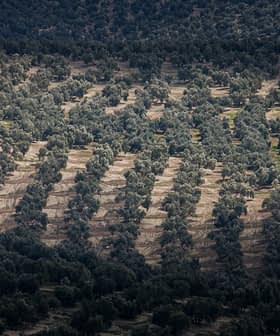With the olive harvest well underway in Spain, authorities expect to produce 1.25 million tons of olive oil in the 2021/22 crop year, which would amount to approximately 42 percent of the global olive oil production.
This confirms forecasts made a few months ago by the Food Information and Control Agency (AICA) and corroborated by the Union of Small Farmers and Ranchers (UPA) Andalusia.
The predictions were based on the effects of prolonged drought on the olive groves in 2021. Rainfall in May was insufficient and did not alleviate the problem.
See Also:2021 Harvest UpdatesAccording to Cristóbal Cano, UPA Andalsuia’s general-secretary for olives and olive oil, initial production estimates were correct.
“We will narrowly exceed 1.2 million tons of olive oil this campaign,” he said. “It must be taken into account that we are practically at 70 percent of the harvest and that, in these months, 867,226 tons have been produced in Spain.”
“Given this situation, we understand that it makes no sense for the Andalusian government to update the production data published in September 2021, at the start of the campaign,” he added. “In the field, what we already said is being confirmed.”
Cano also confirmed that 354,000 tons of olive oil, including imports, had been marketed in Spain after the first three months of the 2021/22 crop year, which started in October.
“Although it is indeed less oil sold than last year, we have to realize that we are coming from two record years for sales,” Cano said. “This year, we experienced lower stocks at the beginning of the campaign and estimated lower production, so we are going to have less oil to market.”
“Even so, sales, and especially exports, are in very good health,” he added. “We have even increased sales in third countries, which shows us, once again, that consumers increasingly value olive oil as the best vegetable fat in the world.”
Cano concluded by arguing that the Spanish olive sector remains the most influential for global production and trade.
He insisted that the only missing component is applying the country’s new agricultural supply chain law and new regulations governing olive oil quality.








